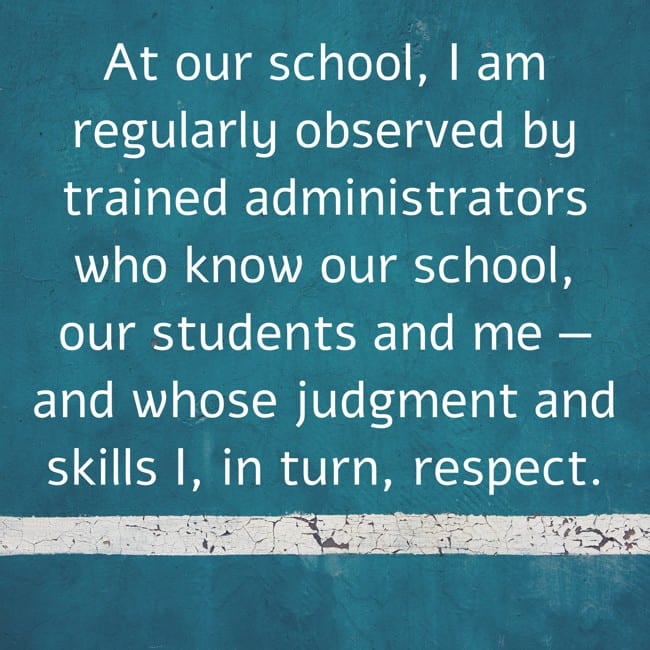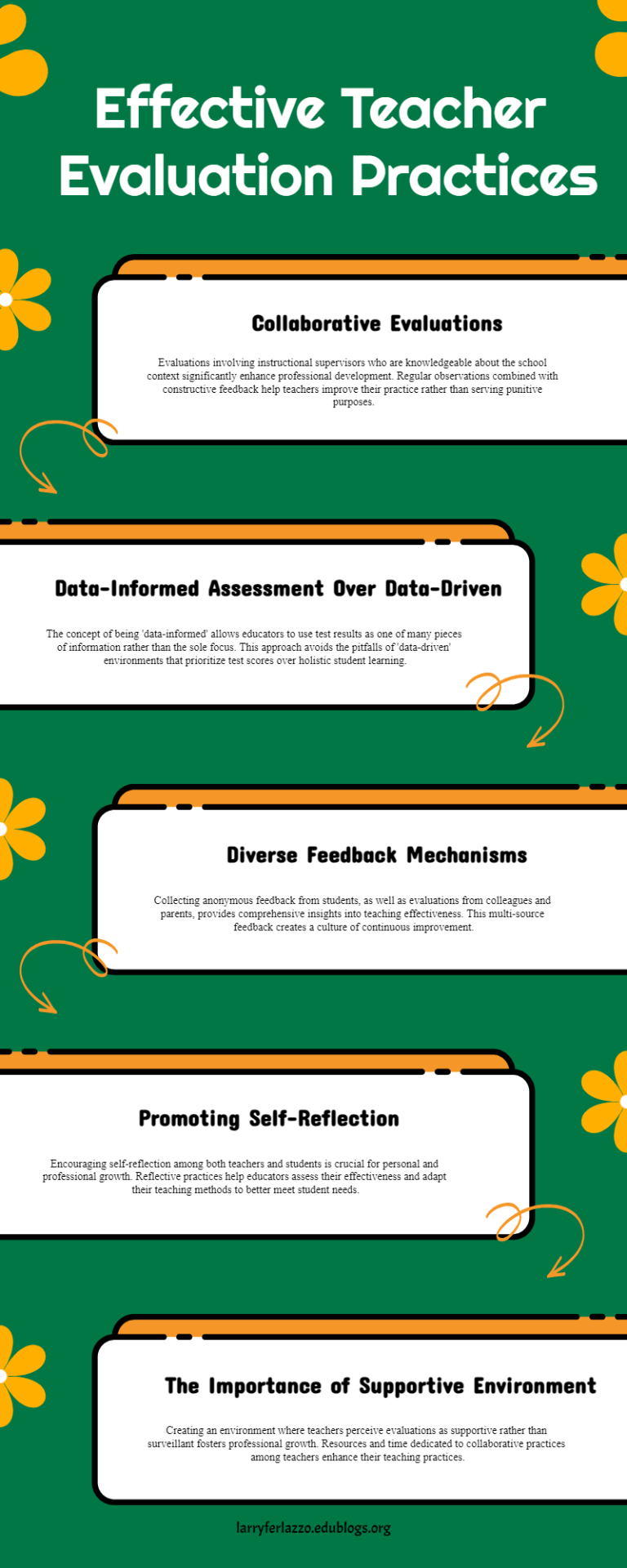(I’m republishing my finest posts from the second half of 2024. You’ll be able to see the complete record of them right here)
I’m republishing about fifteen-or-twenty columns/articles I wrote for numerous publications like ASCD and The Washington Submit over twelve years in the past, however that are not accessible on their web sites. I nonetheless suppose they’ve some relevance at present. I’ll add hyperlinks to those posts to the web page the place hyperlinks to all my articles are positioned.
This 2010 column appeared in The Washington Submit.
What’s the easiest way for academics to be evaluated?
A “loaded” query, certainly. Evaluating somebody’s efficiency is at all times difficult. It has turn out to be much more so in training the place public discussions of recent types of trainer evaluations are sometimes launched within the context of growing a device to fireplace educators. Whether or not it’s New York Metropolis Mayor Bloomberg ordering state take a look at scores to be included in trainer evaluations so (as native newspapers described it) they can be utilized “ to resolve which academics ought to keep and which ought to go,” or D.C. Chancellor Michelle Rhee nearly gleefully exaggerating the variety of academics the District not too long ago fired due to poor evaluations, the thought of revising trainer analysis methods understandably raises a pink flag for a lot of academics.
As an alternative choice to analysis plans that will be finished “to” academics, let me share the methods evaluations are being finished “with” me. The elements of this constructive strategy to analysis have dramatically improved my skilled observe at Luther Burbank Excessive Faculty the place I train. LBHS is a big highschool in Sacramento CA, and over half of our college students are English Language Learners.
I’m noticed by instructionally savvy supervisors who know me
At our college, I’m frequently noticed by skilled directors who know our college, our college students and me — and whose judgment and abilities I, in flip, respect. I do know they’re genuinely involved about my skilled improvement. They perceive that serving to me enhance my abilities is the most effective factor they will do to assist our college students. Our directors sometimes come by for 2 30-minute formal observations every faculty 12 months, and quite a few brief “drop-ins.” Whereas I’m very assured in my capability as a trainer, these purposeful visits have produced detailed and useful suggestions that has made me an excellent higher educator.
My supervisors acknowledge it’s higher to be “data-informed” than “data-driven”
Many reformers name for “data-driven” colleges. At LBHS, principal Ted Appel is a powerful believer in being “data-informed” as a substitute. He understands the worth of knowledge however acknowledges that colleges which are “data-driven” may make choices like protecting college students who’re “borderline” between algebra and a better degree of math within the algebra classroom in order that they do properly on the algebra state take a look at as a substitute of being extra challenged. Or, in English, academics in data-driven colleges may focus a variety of time and vitality on instructing a “strand” that’s closely represented on the state assessments — regardless that that obsessive focus may take away from different instruction that may assist the coed turn out to be a life-long reader. High quality faculty leaders like Appel reject these practices. Given the selection between institutional self-interest and doing what’s finest for college kids, they’ll at all times select the latter and anticipate academics to do the identical.
In colleges which are data-informed, take a look at outcomes are only one extra piece of data that may be useful in figuring out future instructions. There may be recognition that, as a latest fee research by the United States Division of Training reported, “greater than 90 p.c of the variation in scholar achieve scores is as a result of variation in student-level elements that aren’t underneath management of the trainer.”
When take a look at outcomes for my college students a 12 months in the past had been poor (after a number of years of a lot larger scores), Ted Appel and different directors had been conscious that my college students at the moment confronted an uncommon variety of challenges. There have been no threats (implicit or specific) – solely assist – together with the same old annual observations of my instructing. This previous 12 months, with a brand new group of scholars and no main educational adjustments on my half, college students made substantial take a look at positive factors.
We be sure that there are a number of varieties of information
At our college, we acknowledge that actual life shouldn’t be filled with questions that present a number of selection solutions. As an alternative, a precedence is made to have academics frequently give “performance-based assessments” the place college students must assemble their very own responses by writing essays or taking a “cloze take a look at” the place members are requested to interchange lacking phrases and display understanding of context and vocabulary. Academics are given time to create widespread assessments as a bunch, to attain them as a bunch, and to match and talk about the outcomes as a bunch – all within the spirit of being knowledgeable however not suppressed by information.
I hear common suggestions from college students, colleagues and fogeys
In my classroom, I frequently have college students full nameless evaluations of the category and of my instructing. The suggestions I obtain is one other piece of knowledge that may assist me decide the effectiveness of my instruction and make constructive adjustments.
Colleagues additionally observe my lessons. Our giant faculty is split into seven small studying communities (SLCs). In every group, 300 college students stick with the identical group of 20 academics from ninth by means of 12th grade. The academics in my SLC periodically observe each other (purely voluntary, casual, and through our free durations), utilizing a brief guidelines of questions we created ourselves: Are all college students engaged? If that’s the case, how? If not, why? Do you are feeling the expectations of the category are an excessive amount of or not sufficient? Is the work being given larger order considering or simply process work (ebook work)? I’ve additionally had colleagues who noticed my class publish questions on the Net for my college students about my instructing. You’ll be able to see an instance right here.
In colleges, one other very key “ get together” is mother and father. Typically once I converse with mother and father – both over the telephone, throughout house visits, parent-teacher conferences, or open homes — I ask about what their college students say about our class, good and dangerous. I worth this suggestions, and it turns into one other necessary component in my fixed quest to remain data-informed.
Self-Reflection
In my classroom, I work exhausting at serving to my college students develop their capability for self-reflection. With out this self-discipline, they will fall into the entice of dwelling their lives by a method and make the identical errors again and again. They’ll be taught the information however miss the chance to develop an understanding.
The identical holds true for academics. Effectively-known training researcher Robert Marzano emphasizes the significance of self-reflection in any form of efficient trainer evaluation. There are clearly some ways to implement this reflective course of each formally and informally with colleagues and supervisors. I additionally write about instructing in my weblog and take note of the suggestions I obtain from readers.
One easy query I frequently ask myself is one instructed by Marvin Marshall (, a famous author on constructive classroom administration methods. He recommends that academics ask: If I had been a scholar, would I would like me as a trainer?
If sure, record the explanations. If no, record the explanations.
Offering colleges the sources in order that directors have extra time to watch academics; in order that academics are skilled and are supplied time to watch their colleagues; in order that educators have widespread time to arrange and consider assessments that present higher-level considering abilities; and so that every one faculty workers can have interaction extra with mother and father – these are the methods we can assist academics turn out to be the most effective that they are often.
A tradition of collegial skilled observe that includes these sorts of actions is extra prone to make me a greater trainer than someone else’s imposed, arbitrary, and punitive course of ever will.
Right here’s the infographic that Infography manufactured from this publish:

